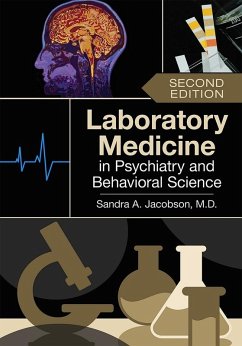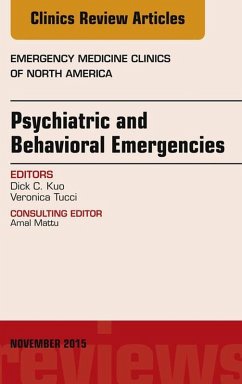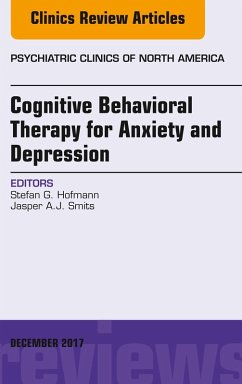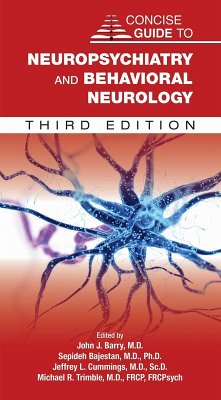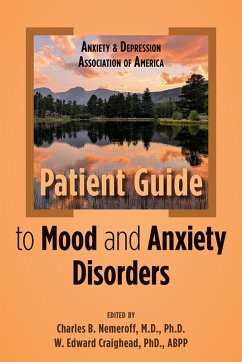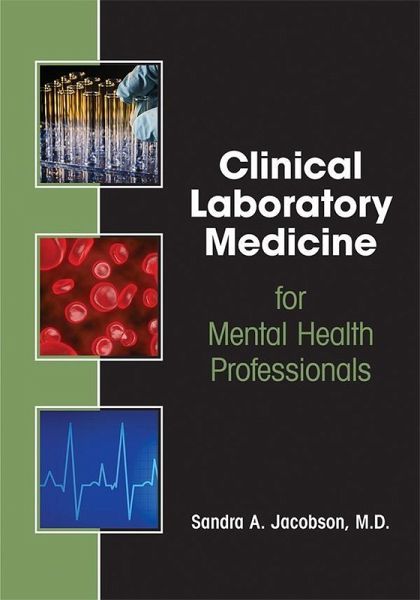
Laboratory Medicine in Psychiatry and Behavioral Science (eBook, ePUB)

PAYBACK Punkte
20 °P sammeln!
A revised, abridged version of the seminal work, Laboratory Medicine in Psychiatry and Behavioral Science, Clinical Laboratory Medicine for Mental Health Professionals more directly address the needs of general psychiatrists and their mental health colleagues in clinical practice.Sections on laboratory tests, diseases and conditions, and psychotropic medications include alphabetically arranged entries, making it easy for busy clinicians to reference the updated information. For each laboratory test, the following information is provided: ¿ The type of test (e.g., blood, urine, etc.)¿ An expl...
A revised, abridged version of the seminal work, Laboratory Medicine in Psychiatry and Behavioral Science, Clinical Laboratory Medicine for Mental Health Professionals more directly address the needs of general psychiatrists and their mental health colleagues in clinical practice.
Sections on laboratory tests, diseases and conditions, and psychotropic medications include alphabetically arranged entries, making it easy for busy clinicians to reference the updated information. For each laboratory test, the following information is provided: ¿ The type of test (e.g., blood, urine, etc.)¿ An explanation of the test¿ The test's relevance to psychiatry¿ Patient preparation¿ Medical and psychiatric indications for the test¿ Numerical reference ranges¿ Critical values for test results¿ The potential meaning of abnormal results (e.g., factors that lead to increased or decreased levels)¿ Interfering factors¿ Cross-references to other tests or conditions
Information on clinical diagnosis and laboratory testing is provided for diseases and conditions, and psychotropic medications are examined from both a screening and a monitoring standpoint. Extensively indexed, this guide also includes an appendix that features at-a-glance information on therapeutic and psychotropic levels, 10 rules for deciding whether an ECG is normal, and several figures covering topics relevant to tests, such as ECG waves and intervals, cholestatic injury, bilirubin cycle, and SIADH secretion.
Years of clinical practice and research inform both the choice of tests included and the rationale for their use, making Clinical Laboratory Medicine for Mental Health Professionals the definitive, authoritative reference for psychiatrists and other behavioral health clinicians.
Sections on laboratory tests, diseases and conditions, and psychotropic medications include alphabetically arranged entries, making it easy for busy clinicians to reference the updated information. For each laboratory test, the following information is provided: ¿ The type of test (e.g., blood, urine, etc.)¿ An explanation of the test¿ The test's relevance to psychiatry¿ Patient preparation¿ Medical and psychiatric indications for the test¿ Numerical reference ranges¿ Critical values for test results¿ The potential meaning of abnormal results (e.g., factors that lead to increased or decreased levels)¿ Interfering factors¿ Cross-references to other tests or conditions
Information on clinical diagnosis and laboratory testing is provided for diseases and conditions, and psychotropic medications are examined from both a screening and a monitoring standpoint. Extensively indexed, this guide also includes an appendix that features at-a-glance information on therapeutic and psychotropic levels, 10 rules for deciding whether an ECG is normal, and several figures covering topics relevant to tests, such as ECG waves and intervals, cholestatic injury, bilirubin cycle, and SIADH secretion.
Years of clinical practice and research inform both the choice of tests included and the rationale for their use, making Clinical Laboratory Medicine for Mental Health Professionals the definitive, authoritative reference for psychiatrists and other behavioral health clinicians.
Dieser Download kann aus rechtlichen Gründen nur mit Rechnungsadresse in A, D ausgeliefert werden.




